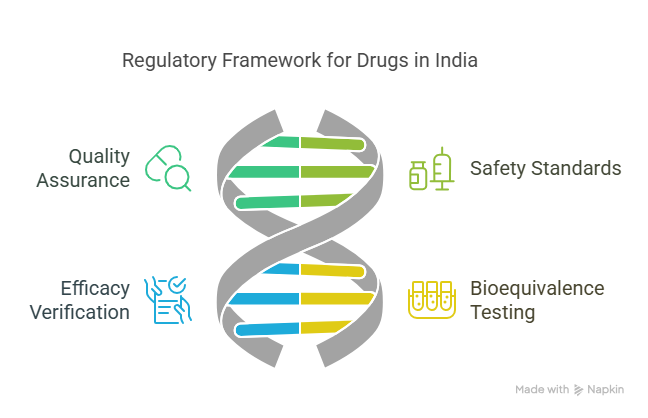“The biggest risk is not taking any risk…” Mark Zuckerberg. This phrase speaks to the decisions that people and healthcare professionals make about prescription drugs in the pharmaceutical sector. Choosing between branded and generic medications is a big choice.
Making educated selections requires an understanding of the main distinctions. Pharmaceutical businesses that make significant investments in research and development create and sell branded medications. However, generic medications are less expensive alternatives.
The pharmaceutical industry is complicated, and a number of variables affect the drug that is chosen. As we learn more about the pharmaceutical industry, it becomes evident that understanding the differences is essential for patients as well as healthcare professionals.
Recognizing the Distinction Between Generic and Branded Drugs
Making educated healthcare choices requires an understanding of the differences between branded and generic drugs. These two categories of medications differ not only in their names and packaging but also in the way they are developed, priced, and approved by the government.
Branded drugs: what are they?
Pharmaceutical corporations create and sell treatments known as “branded drugs.” In order to demonstrate their safety and effectiveness, these medications usually need a large expenditure in clinical trials as well as a great deal of research and development. After a branded medicine is authorized, the company is granted a patent that, for a certain amount of time, prevents other businesses from making the identical drug.
High research and development expenses are often linked to branded medications, and this is reflected in their cost. Both people and healthcare professionals are more likely to recognize them since they are often well-known and widely advertised.
Describe generic medications.
Conversely, generic medicines are reformulated copies of branded pharmaceuticals that are manufactured after the original drug’s patent has expired. Generic medications are thought to be therapeutically similar to their branded equivalents since they contain the same active components. This indicates that they are just as safe and effective as the name-brand medication.
Because the producers do not have to spend as much money on research and development as the original branded medicine did, the cost of producing generic medications is lower. Usually, these cost reductions are transferred to customers, making generic medications a more economical choice..
Indian Regulatory Requirements
The Central Drugs Standard Control Organization (CDSCO) is responsible for regulatory control of both branded and generic medications in India. All medications, branded or generic, must adhere to certain quality, safety, and effectiveness requirements set by the CDSCO.
In order to be authorized, a generic medication must show that it is bioequivalent to the brand, which means that it must have the same active component, dose form, potency, and administration method as well as the same pharmacokinetic and pharmacodynamic characteristics.
India’s regulatory structure is intended to safeguard the public’s health by guaranteeing the efficacy and safety of both branded and generic medications.

Cost, Availability, and Quality Comparison of Generic and Branded Drugs
It’s critical to comprehend how branded and generic drugs vary from one another, especially with regard to cost, quality, and market accessibility. Making educated healthcare choices requires this comparison.
Price Variations and Their Effect on the Economy
The price gap between branded and generic drugs is the most obvious distinction. Because they are created and promoted by pharmaceutical corporations that make significant investments in research and development, branded medications are usually more costly.
Cost Comparison: Compared to generic medications, brand-name medications are sometimes two to five times more costly. People and healthcare systems may be greatly impacted by this price disparity, particularly those who need long-term medicine.
| Medication Type | Average Cost per Unit | Economic Impact |
|---|---|---|
| Branded Drugs | $X | High expenditure for healthcare systems and individuals |
| Generic Drugs | $Y (significantly lower than $X) | Cost-effective for both healthcare systems and individuals |
Aspects of Quality and Effectiveness
The idea that generic medications are less effective and of lower quality than branded ones is a prevalent one. Nonetheless, regulatory bodies need generic medications to adhere to the same strict guidelines as their branded equivalents.
Addressing Frequently Held Myths
Regulatory Standards: Only when a generic medication is determined to be bioequivalent to a branded medication—that is, to have the same active component, dosage form, potency, and mode of administration—are they permitted.
The idea that generic medications are less effective is debunked by strict regulatory regulations that guarantee their quality and effectiveness.

Accessible in the Indian Pharmaceutical Industry
A large selection of both branded and generic drugs is a defining feature of the Indian pharmaceutical sector. Particularly common are generic medications, which account for a considerable share of the market.
Market Presence: The availability of generic pharmaceuticals in the Indian market has improved public health outcomes by making necessary treatments more accessible.
Conclusion: Choosing Medicines Wisely
Making educated healthcare choices requires knowing the distinctions between branded and generic medications. Both kinds of drugs play a role in the pharmaceutical industry, and understanding their differences helps improve patient results.
Choosing between branded and generic prescription medications might have a big influence on how much your treatment will cost. Because they are less expensive, generic medications may increase access to healthcare, but branded medications could have unique advantages that make up for their higher price.
Contrarily, over-the-counter medications are easily accessible and do not need a prescription. Making educated decisions about your self-care may be facilitated by being aware of the distinctions between branded and generic versions of these drugs.
In the end, knowing your pharmaceutical choices gives you the ability to take charge of your health. You may choose options that best fit your demands and budget by taking into account variables like price, quality, and availability.

